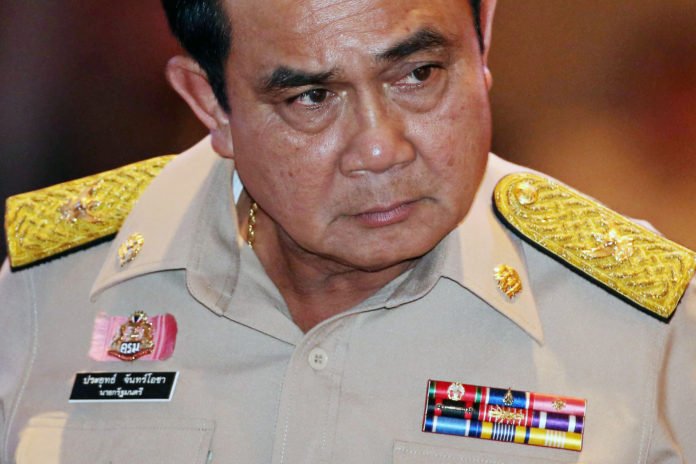One of the best ways to rig an election is to make it impossible for the opposition to win before the ballots are even printed. Thailand’s military junta is conducting a master class on exactly that as the country lurches toward elections on March 24.
Last week, the junta used the court system to prevent one of the main civilian-led political parties from even contesting the upcoming vote.
And all the while, President Trump’s White House and the State Department are silent. Once more, Trump’s administration is allowing an autocrat to get away with it.
In 2014, Thailand’s shaky democratic foundations were blown up by a military coup d’etat. General Prayuth Chan-ocha wrested control from the elected prime minister, Yingluck Shinawatra. She had effectively ruled as a proxy placeholder for her exiled brother, the authoritarian populist billionaire Thaksin Shinawatra. He had won landslide elections in 2001 and 2005 before being overthrown in a 2006 coup d’etat. The military forced him to flee the country. Even from abroad, the shadow of Thaksin has loomed large over Thailand’s volatile politics.
For years, Thailand’s politics have been rocked by a cascade of crises that are linked to one overarching dilemma: The Thai military brass will not accept a Thaksin-affiliated leader, but a free and fair election would almost certainly lead to a Thaksin-affiliated leader taking power, because his movement remains extremely popular.
That’s why the junta is rigging the upcoming election — creating an uneven playing field with a new constitution, getting a political party disbanded, and trying to jail opposition leaders — to retain power while blocking Thaksin’s influence.
The new constitution adopted under the military junta stacks the deck in favor of the generals. It specifies that the prime minister is elected from the combined members of the House of Representatives and the Senate. But the 250 members of the Senate are appointed directly by Thailand’s military rulers. All of them will support Prayuth in his quest to retain power. That means his pro-junta party (called Palang Pracharat) needs to win only 126 seats out of 500 in the elected House of Representatives to secure victory (250 plus 126 is more than half of the 750 total seats). It’s a funny kind of “democracy” when a general needs to win just 25 percent of the elected seats to become prime minister, while his civilian rivals need to win a combined 75 percent of the elected seats to secure the same job.
Nonetheless, anti-junta parties could, with enough votes, deny Prayuth that victory. But last week, the ruling regime had the Thai Raksa Chart party, which was part of the movement affiliated with Thaksin, disbanded. A court dissolved the party, citing its attempt to nominate Princess Ubolratana Rajakanya, the king of Thailand’s sister, as its prime minister candidate. Doing so tested the limits of the dividing line between the monarchy and civilian politics, and it appears that Thai Raksa Chart crossed that line. Sean Boonpracong, the former national security adviser to Yingluck, objected to the ruling, telling me that it was “bizarre” and “fishy even in the Thai context.”
With a major Thakskin-allied party gone, some of its supporters will flock to support the anti-junta Future Forward Party instead.
Yet the junta is trying to send Thanathorn Juangroongruangkit, the leader of that party, to jail. Thanathorn, often referred to as the “billionaire commoner,” is a charismatic auto-parts tycoon who has energized young, urban voters. His story is compelling: He’s a billionaire committed to tackling Thailand’s grotesque inequality who runs ultra-marathons across the Sahara and the Arctic in his spare time. Some have suggested he’s Thailand’s version of French President Emmanuel Macron — a wealthy, young politician who could break Thailand’s political mold with a new brand of politics.
But Thanathorn also faces criminal charges under Thailand’s draconian Computer Crime Act for broadcasting a video on Facebook in which he criticized the junta. For that “crime,” he could face years in prison. Some activists have called for his party to be disbanded.
Late last year, I spoke to Thanathorn in his party headquarters, which are housed within his family’s 34-story tower in Bangkok. “I’m not worried by those charges,” he told me. “I’m worried that our country is plagued by coups d’etat. We go from crisis to coup to crisis. I want to make coups part of our history rather than part of our future. As soon as I’ve done that, I will retire from politics.”
Parties like Future Forward should be able to feel confident that the United States will have their back as they fight to restore Thailand’s civilian-led democracy. Instead, crickets. None of the recent news releases on the website for the U.S. Embassy in Thailand raise any objection to the junta’s blatant manipulations of the upcoming election. Instead, they focus on ceremonial decrees and the Thai cave rescue. In my discussions with an array of pro-democracy politicians and activists in Thailand, all of them told me they feel abandoned.




